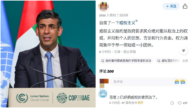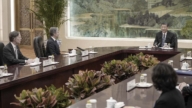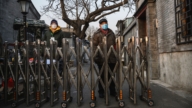【新唐人2013年01月08日讯】中国网民7号在广州“南方报业集团”大楼门口献花,声援《南方周末》编辑部。网友还在网上贴出各地《南方日报》记者站的地址,提供给需要到实地表达立场的网友。6号晚间,《南方周末》报社员工通过各种渠道发表联署声明,部分编辑记者宣布罢工。中国境外媒体认为,这似乎是中国媒体人的“起义”到来!但是,大陆媒体人这条吁请新闻自由及宪政民主的抗争路能走多远?请看本台记者的分析报导。
《南方周末》2013年新年献词被窜改,违反出版程序事件,官方媒体避而不报,微博世界却相当热闹,声援《南方周末》行动,得到来自媒体同行、律师、学者、高校学生、作家、企业家、演艺界人士及中国网民的广泛支持,有媒体指称,声援的南周事件,逐渐演化为一场吁请新闻自由及宪政民主的抗争运动,像是媒体人的“起义”到来。
不过《南方周末》新浪官方微博1月6号晚间发表声明,指称新年特刊导言不是早前媒体人传出的是广东省委宣传部部长庹震操刀,而是“报社负责人草拟”。
在此之前,《南周》官方微博管理人吴蔚已经通过个人微博透露,《南周》官方账号他已上交上级相关负责人毛哲,他不再对今后发布的内容负责。
而经官方认证的报社经济部微博,也发表署名南周编辑部的声明说:南方周末新浪官方账号已被强行收缴,此微博在2013年1月6号21点30分发表的《致读者》,并非真相,他们将陆续通过公开途径发布准确信息。包括《南周》编委、经济部、文化部、新闻部等几十位记者联署了这份声明。同时已经有多位《南周》记者开始罢工表示抗议。
但报社经济部微博以及多位跟进发布事件进展的媒体人的微博,很快的遭到官方删除。
而中国网友发起1月7号到《南方日报》大院门前献菊花行动,一名到现场献花的女士向媒体表示,否认庹震窜改新年献词,“这是藐视网民的智商”,所以她前去献花﹗声援《南方周末》。
现场网友还打出标语:“取消新闻审查、声援南方周末、要求新闻自由”,并且说,站在现场的都代表《南方周末》,他们纷纷喊出“我是南周”。
原中央某机关报中层负责人刘亚伟:“我90年代曾经在一个中央部委的报纸,做过总编室主任,像这种情况是很常见,但是现在是一个众媒体的时代,并且大家的民智也已经不是那个时代了,但是这帮官员还是采取那种管理媒体的方式,认为,媒体嘛!就都是他们的领域,他们想干啥就干啥,他们就忽略了现在时代的特点。”
不过,这名原中央某机关报的中层负责人刘亚伟认为,舆论阵地是中共当局的死穴,他们不会轻易放开。他说,不要期望当局退让。而北京独立制片人朱日坤也向《新唐人》表示,他对抗争的结果感到“不乐观”。
北京独立制片人朱日坤:“我觉得现在也还不能非常乐观,因为虽然说有不少的人在声援,然后南方周末他们本身的很多人,也出来表示自己的态度,只是…实际上可能很多人只是希望解决本身这个问题,而并不一定是说争取一个完全的新闻的自由。”
朱日坤说,这场抗争对整个新闻业会有一点帮助,但是反过来说,这也是在延续新闻审查的制度。
而中国新媒体人北风向《德国之声》表示,媒体人会提出什么样的诉求,将决定事件未来走向和意义。他们罢工这种激烈的行为,“路能走多远,这要看他们的决心和勇气。”
采访/常春 编辑/周平 后制/萧宇
How Far Will Southern Weekly’s Protest Go?
On January 7, Chinese netizens presented flowers
outside the Southern Daily Group’s office building in Guangzhou, in support of Southern Weekly.
Netizens even posted on the internet the addresses
of the newspaper’s bureaus across China.
On January 6, joint announcements by the Southern
Weekly staff appeared through various channels.
Some editors and journalists even staged a strike.
Overseas media view it as an “uprising" by China’s media.
The forced alteration of Southern Weekly’s 2013
New Year message was ignored by official media of the Chinese Communist Party (CCP).
In contrast, it has become a heated
topic in the micro-blog world.
The Southern Weekly has gained wide public support
from media professionals, lawyers, scholars, college
students, writers, entrepreneurs, entertainers, and netizens.
The Southern Weekly incident was reported to have
evolved into a protest, calling for media freedom
and constitutional democracy, as a media “uprising".
In the evening of January 6, the Southern Weekly’s
official Sina microblog (Weibo) released an announcement.
It claimed that the New Year editorial was not altered
by Tuo Zhen, Guangdong CCP propaganda chief.
Rather, it was “drafted by a chief of the newspaper”.
Prior to that, Wu Wei, administrator of the newspaper’s
official Weibo account, made a personal announcement.
Wu said he had turned in the password for Southern
Weekly Weibo account to his boss Mao Zhe.
He would no longer be responsible for
any content published by that account.
An announcement in the name of Southern Weekly
editorial office was published on the official Weibo
account of the newspapers’ Economy office.
It said that Southern Weekly’s official Weibo
account had been “forcedly taken over”.
The “Messages to Readers” published by that account
at 9:30pm on January 6, 2013 was not the truth.
They would gradually disclose accurate
information through public channels.
Dozens of Southern Weekly reporters
signed the announcement.
Meanwhile, some journalists at the
paper launched a strike to protest.
But soon after, the CCP authorities removed the
official Weibo account of Southern Weekly Economy.
So were Weibo accounts of several media
professionals who published follow-up reports.
Netizens initiated a drive to present chrysanthemum flowers
outside the Southern Daily’s headquarters on January 7.
Media reported that a female participant said the denial
of Tuo Zhen’s alteration was “defiance of netizens’ IQ’s”.
That was why she joined in presenting
flowers to support the Southern Weekly.
On-site netizens held banners reading, “Abolish Censorship,
Support Southern Weekly, Demand Media Freedom.”
They even shouted together, “I’m the Southern Weekly.”
Liu Yawei, former middle manager
of a CCP official newspaper:
“In the 1990s, I was in charge of the Chief Editor’s
Office for a CCP central official newspaper.
An incident like this is really commonplace in practice.
But now it’s an era of mass media, and the Chinese
people aren’t that fooled as they were in the past.
But CCP officials still used their old practices
to control media, just doing whatever they want.
They overlooked the features of this era, indeed.”
Liu Yawei remarks that media is the CCP regime’s
Achilles Heel, and they will not loosen media control.
He warns not to expect CCP’s concession.
Zhu Rikun, independent filmmaker in Beijing,
says that he is “not optimistic” about the outcome.
Zhu Rikun: “I don’t think it’s very optimistic.
Now there’s wide public support, and the
Weekly’s staff also announced their position.
But, lots of people just did it to solve the problem
itself, not exactly to strive for a full media freedom.”
Zhu Rikun says the protest will slightly help
China’s media, but on the other hand, there
is also a continuous censorship of press.
Media veteran Bei Feng told Deutsche Welle that media
professionals’ demands will decide how the event evolves.
As for their strike, Bei Feng comments that how far they
can go is dependent on their determination and courage.





























